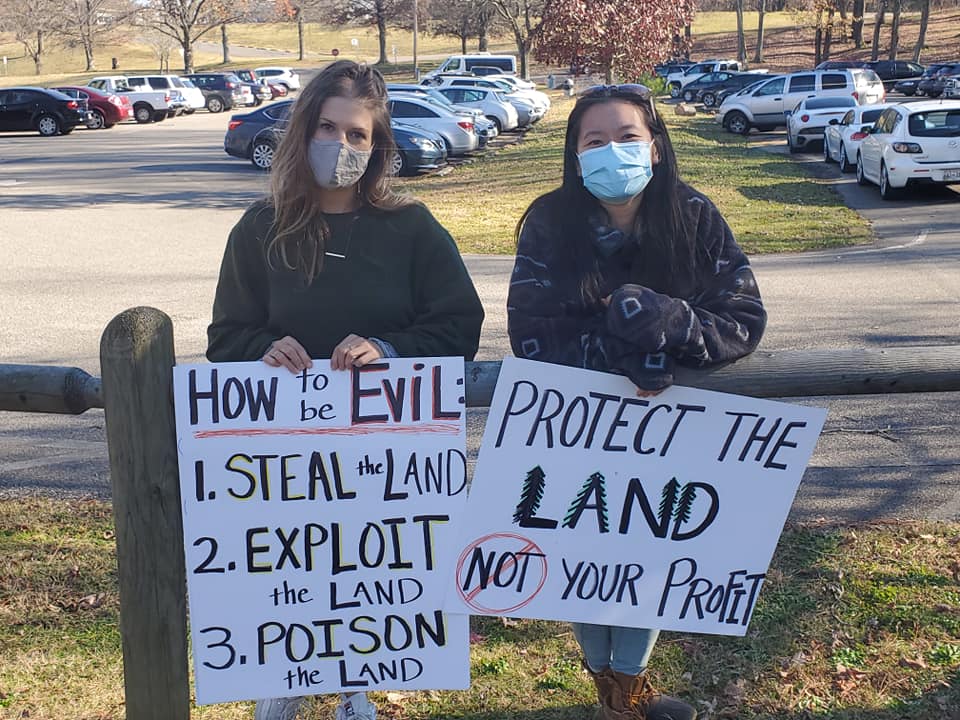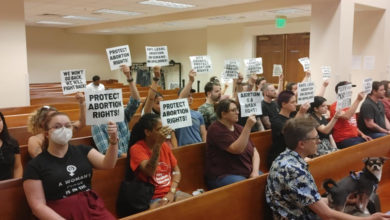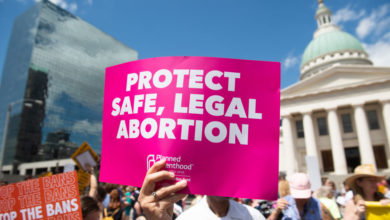A crowd of nearly 60 residents and activists gathered on Saturday at T.O. Fuller State Park in the Boxtown neighborhood to protest Valero’s construction of a new pipeline in Memphis, Tenn.
Cutting across some of the most marginalized neighborhoods in the city, the Byhalia Connection Pipeline threatens the health and safety of thousands of Memphians, mostly Black. But residents from the Boxtown Neighborhood Association, Protect Our Aquifer, Black Lives Matter, and the Facebook group Memphis Community Against the Pipeline are organizing to oppose the project. As resident and organizer Baxel Booker said at the rally, “For too many years, Boxtown has been the dumping place for the rest of Memphis.”
Such projects are typical of the environmental racism that accompanies capitalism. The smell of human waste floated over the demonstration. Just a few blocks away, the city had installed a massive sewage treatment facility, leaving Boxtown residents to deal with the smell and potentially adverse health effects. This waste treatment facility joins a long list of dangerous industries that have set up shop in their neighborhood, including an iron mill, a steel mill, a chemical plant, Valero’s oil refinery and the now defunct Tennessee Valley Authority Allen Fossil Plant, which left behind a pond of toxic coal ash.
The benefit from the handful of mostly temporary jobs that have come with these installations has been offset many times over by the erosion of property values and these projects’ effect on mental and physical health in the historically Black neighborhood. As cited in MLK50’s coverage of the protest, scientific studies have connected living near an oil refinery with increased risk of bladder, lung, colon, prostate and breast cancers.
However, working-class residents of Boxtown are done being “the path of least resistance” as one of the land agents working for the pipeline condescendingly described the area. Instead, residents are organizing, pressuring local politicians and regulators to stop the project.
‘They want to put this pipeline four feet down? They bury the dead six!‘
One of the primary concerns voiced by residents at the rally was that inadequate safety measures were being taken by the oil pipeline company, which plans to lay the pipeline just four feet underground. Although such pipelines are dangerous no matter the depth, it is offensive and sadistic that the corporation proposes such a reckless plan.

Much of this shirking of safety standards is rooted in the same drive for increased profits motivating the overall project. As Pam Kimberly Pearson, a Boxtown resident and organizer, pointed out at the rally, “They’ve been transporting it by truck and they can keep doing that.”
The only reason Valero is building the pipeline is to streamline distribution between Memphis and its refinery in Marshall County, thus cutting costs to the company, and connecting two transnational pipelines — the Diamond pipeline out of Oklahoma and the Capline, which connects the Midwest to the Louisiana Gulf Coast.
Of course, these savings will only benefit the shareholders. Powerful contractors in Memphis also stand to be enriched by the project, and the ‘friends’ they have bought off in local non-profits, the NAACP, the University of Memphis, and elected office are working to ensure that the project is green lighted, no matter the opposition from concerned residents.
However, the residents of Boxtown, Frayser, and other historically Black neighborhoods in the city understand that these pipelines are notoriously dangerous to the safety of their communities. The proposed pipeline will go right through the Davis Well Field, which provides drinking water to residents.
As resident and protest organizer Kathy Robinson said at the rally: “[The company] came into the community and told people the pipeline would be safe. … But let me tell you what they did not tell us … [t]hat they were responsible for an oil spill in California just a few short years ago … that because of that spill, 3,000 barrels of oil were dropped into a small community … that they were slow to even report it … that they were convicted in a court of law for water pollution.”
The company has refused to conduct an environmental impact assessment or to produce a safety plan that accounts for the geology of the area, which rests on a fault line.
This callousness and disregard is indicative of historical patterns of repression and capitalist domination in Memphis. The police — the armed enforcers of property relations in Memphis — have been caught illegally spying on Black Lives Matter activists for years, and in response to protests this summer, the state government passed a bill making nonviolent occupations and other protest actions punishable as felonies.
Reactionary laws around housing and workplace organizing have made it difficult for communities to organize mass opposition to the capitalist class. However, the tide is turning.
‘No oil in our soil!‘
The Byhalia Connection Pipeline reflects a sadism inherent to extractive capitalism. Resident after resident pointed out that the city would rather green light dangerous pipelines than switch to sustainable energy sources. Marquita Bradshaw, who ran for senate under the endorsement of the Democratic Socialists of America, pointed out this contradiction, saying, “When we should be advocating for a just transition away from the pollution, you have elected leaders on both sides of the [Mississippi-Tennessee] border who have turned their heads away and are making deals.”
But no matter the governing party, energy sustainability cannot be achieved under capitalism. Corporations know that renewable energy would disrupt their monopoly on fuel production and reduce their profits; access to the sun and wind cannot be privatized and monetized. That is why for years they have worked to suppress knowledge of the catastrophic effect of fossil fuels on our climate, have blocked efforts to develop sustainable energy production, and have lobbied for laws making it illegal to protest against oil companies.
The pipeline is just one set of permits, the Nationwide 12, away from approval. Although several speakers alluded to the need to appeal to the U.S. Army Corps of Engineers, which issues these federal water crossing permits, there is no precedence for the success of such an appeal, and the Army Corps have been misusing these permitting processes for years to shirk public processes and environmental impact statements (see examples here).
The bourgeois democratic state is not designed to protect the people but to enrich the capitalists, and the illusory permitting, zoning, and regulatory guidelines are only there as a thin veneer for their exploitative practices.
In truth, capitalists control the formal legal processes from beginning to end. As local resident and attorney, Ricky Wilkins, said at the protest of the Memphis business elites he encounters in his legal practice: “They use their resources to control this city. They control it from the time you wake up in the morning til the time you go to bed at night. And when you are sleeping, they still control it.” There are, however, examples of mass organizations in Memphis using public pressure to block the oil industry from enacting its will.
Just this year, residents in Prospect Park, a North Memphis neighborhood, came together to oppose the construction of a gas station in their neighborhood. The public pressure they mounted led regulatory bodies in the city to recommend rejecting the project, and local politicians had no choice but to turn the project down. Eventually, the developer dropped it. (MLK50)
It is only through this militant self-organization of the working classes that we can mount successful opposition to the forces of capital. As a resident pointed out to participants at the rally, “You are the leaders you’ve been waiting for!” PSL Mississippi stands in solidarity with these residents to fight back against the greed and exploitation put upon us by the capitalist class. We are heartened by the gathering of neighbors to oppose this pipeline, and will continue to push together for militant opposition to this racist, genocidal pipeline project.
Photos: Kizzy Jones. Used with permission.






